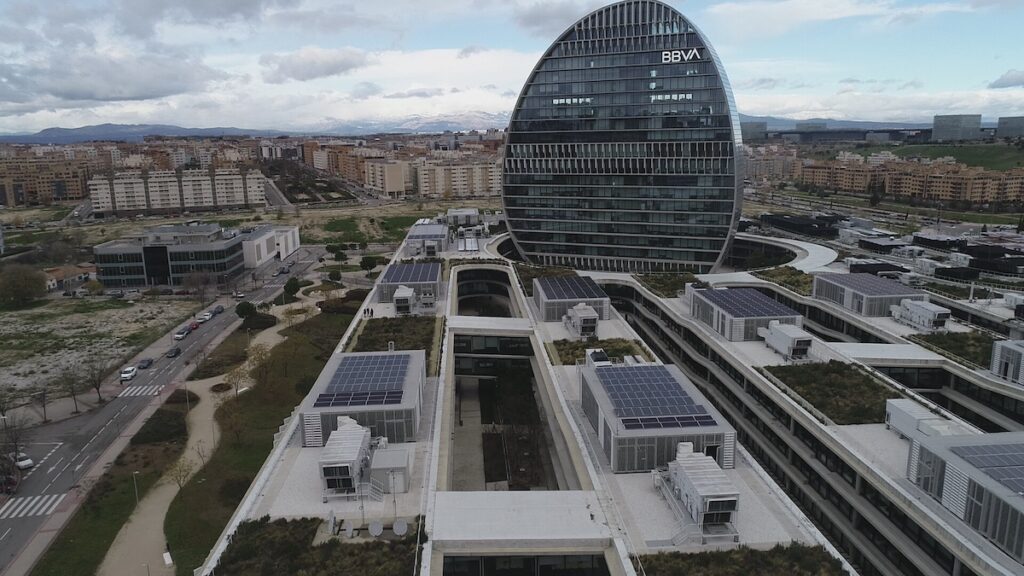The world is living in an age of unprecedented changes and sustainability poses three major challenges: fighting climate change, preserving natural capital and driving inclusive growth. And these three challenges call for massive investments of around 8 percent of global GDP every year until 2050 for climate change alone.
Given this scenario, the fight against climate change represents one of the greatest disruptions in history with great opportunities for banks, through helping clients to move towards a more sustainable world, minimizing the risks while maximizing the opportunities that arise.
For all these reasons, BBVA incorporates sustainability at the heart of its strategy, being one of the six established strategic priorities. This strategic priority has been divided into two objectives included in BBVA’s General Sustainability Policy, which are:
- Foster new business through sustainability
- Achieve Net Zero 2050
For BBVA, sustainability includes three areas of action: climate change; natural capital and sustainable and inclusive growth. Today the bank has clear goals, a plan and it is already delivering. To reach those goals we have robust governance, and we are embedding sustainability into all our processes to become a core element of our business as usual. One of the key components of our plan is transparency.
These are some of the most remarkable latest achievements:
On sustainable finance mobilization, BBVA has increased its goal two times up to €300 billion between 2018 and 2025. Until September 2023 the bank has already channelled €185 billion, and developed ambitious business plans in key areas such as renewable energy, energy efficiency, mobility, clean tech, agribusiness and social.
Setting intermediate net zero targets by 2030 in the most carbon intensive sectors in line with the NZBA guidelines,such as power generation, oil & gas, production of steel and cement, auto and coal. In brief we will announce our targets in other sectors (aviation, shipping and real estate). The bank has published this year its clients’ progress toward decarbonization for the first time.
We are disclosing using the most advanced standards. This year we have released our fourth TCFD report which is the initial version of our climate transition plan and where we have incorporated several GFANZ recommendations on putting together a transition plan, a central aspect when it comes to enhancing understanding of how BBVA is tackling the transition through all our stakeholders.
Beyond climate, BBVA has also set targets in line with the commitment on financial health and inclusion. From 2018 to September 2023, BBVA channels €42 billion to inclusive growth projects. The bank actively contributes to the economic and social development of its host communities, seeking to benefit people and strengthen the social fabric by fostering a fairer, more cohesive and more resilient society, where everyone has the opportunity to thrive.
BBVA is the most sustainable bank in Europe for the fourth consecutive year according to the Dow Jones Sustainability Index in 2023, the global benchmark for sustainability. It obtained the second-highest score in the worldwide category of banks.

Views and insights towards sustainable finance, climate change and decarbonization
For the world to function with net zero emissions it will be required to channel investment not only to green activities and projects, but also to fields where it is hardest to reduce the environmental impact. If the world wants to succeed in the climate goals the banks have to help the whole economy in its transition.
“Decarbonization will occur when investments in emerging green technologies prove profitable”.
Carlos Torres Vila, BBVA Chair
This far-reaching and necessary transformation implies a radical shift in sectors, business models and activities, and will require massive government and private sector investment. But that investment will only become a reality if it makes economic sense. Banks are a major intermediary, but the key lies with all actors in society, including investors, companies and the general public.
Regarding the energy transition, more national platforms in all regions will be needed to support clean energy, with increased combined finance via the use of public funds for development and private capital. Consistent frameworks (standards, labels, taxonomies, etc.) will also help speed up the flow of private sector finance for sustainable development.
There is a critical need to raise the investment commitment of developed countries to emerging and developing nations so as to decarbonize the economy. Currently, this commitment stands at $100 billion a year. That figure will need to be multiplied many times over in order to tackle climate change.
“Our core business has a positive impact on society by promoting and financing projects for the energy transition and inclusive growth, including entrepreneurship, inclusive infrastructure and financial inclusion initiatives.”
Javier Rodríguez Soler, Global Head of Sustainability y Global Head of Corporate & Investment Banking (CIB)
Investment in technology, a game changer in the race to zero
In order to create the best enabling framework to support the green transition, we should use technology maturity in three levels where public policies are critical to incentivize additional private investment. Investment in technology will be a game changer in the race to zero. Having the right policy framework and working in partnership is critical to promote the financial flows required.
In this line, BBVA has signed investment commitments in five funds to drive the energy transition such as Fifth Wall, Hy24, Just Climate, LowerCarbon, SUMA and Decarbonization Partner. The bank brings its investment in decarbonization funds to €108 million. These funds invest in firms that are developing critical technologies for the decarbonization of the planet, such as carbon capture, as well as in companies that are bringing to industrial scale solutions to decarbonize high-emission sectors, such as energy, transportation, steel, cement, and so on.
More information visit www.bbva.com

